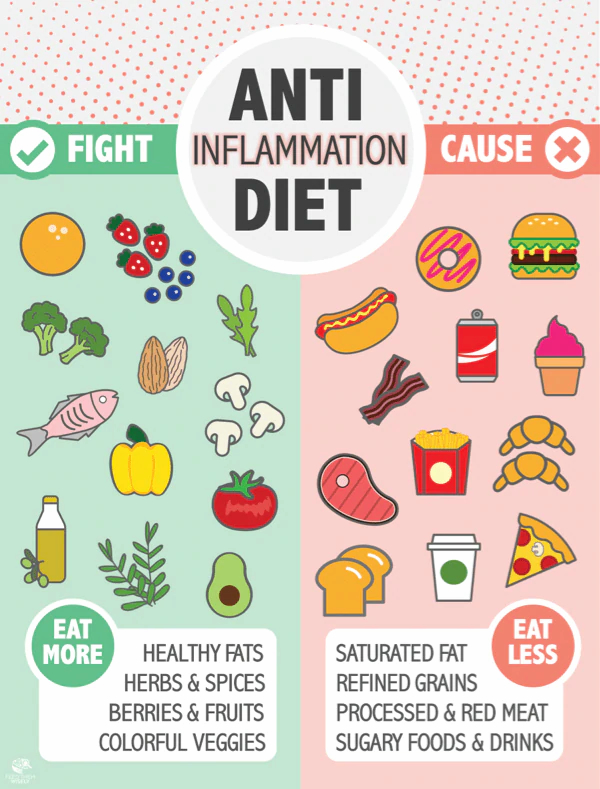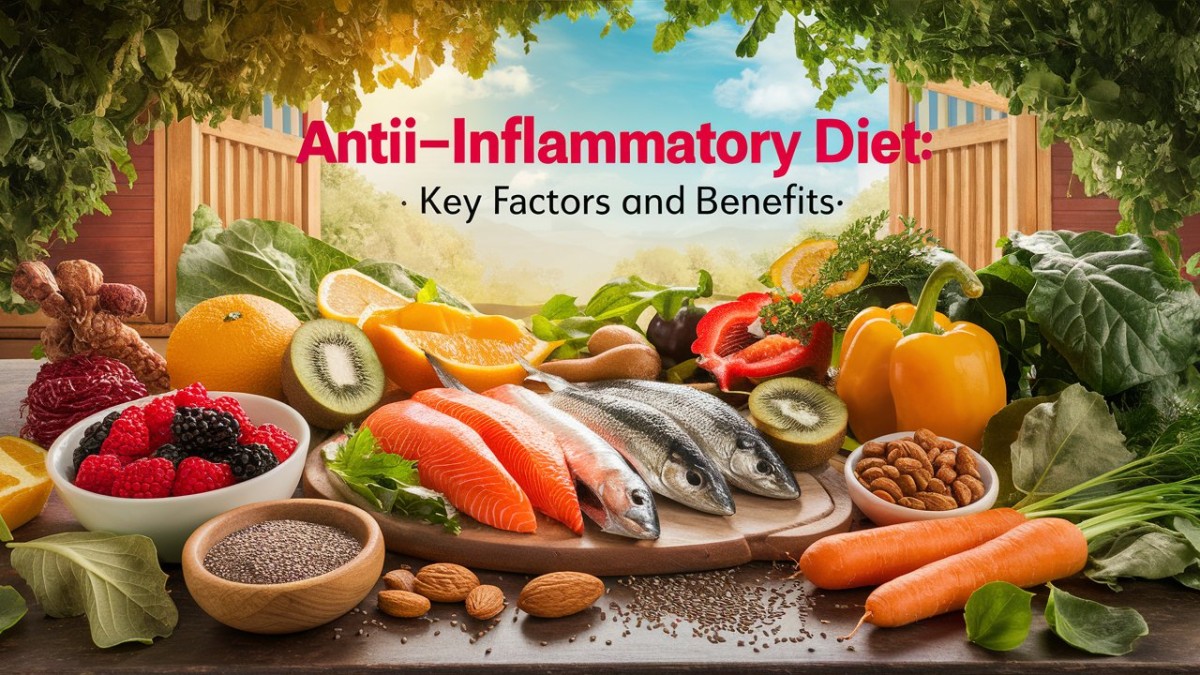Have you ever heard about an anti-inflammatory diet?
No! What's an anti-inflammatory diet?
Oh, you've missed out on one of the important diet plans that are essential for keeping you far from most chronic diseases.
Now without any further delay let's explore everything regarding an anti-inflammatory diet. Firstly we need to understand,
What's inflammation?
You would have heard this in the causes of most diseases or the benefits section of certain diet plans as this diet plan reduces inflammation, so inflammation can be said as the natural response to the body's immune system for injuries, infections, or any other harmful health problems. Inflammation can be the reason for most chronic diseases such as diabetes, cancer, heart diseases, and autoimmune disorders. Now,
What's an anti-inflammatory diet?
After understanding inflammation you can guess a little bit about an anti-inflammatory diet It is a diet that aims to reduce inflammation by promoting overall health and preventing the risk of most chronic diseases.
The anti-inflammatory diet is mainly about reducing the intake of foods that cause inflammation and includes foods that reduce inflammation.
Key factors of an anti-inflammatory diet:
The key factor means the foods that should be included in an anti-inflammatory diet:
Food groups |
Key Factors |
|
Fresh fruits and vegetables |
So fruits and vegetables that are rich in antioxidants, vitamins, and minerals should be included in your diet. The anti-inflammatory fruits and vegetables are berries, green leafy vegetables, tomatoes, and cruciferous vegetables such as broccoli and cauliflower. |
|
Healthy fats |
Healthy fats such as omega-3 fatty acids, are found in fatty fish, flaxseeds, chia seeds, and walnuts. Monounsaturated fats, found in olive oil, avocados, and nuts, are also effective in reducing chronic inflammation. |
|
Whole grains |
Whole grains such as quinoa, brown rice, oats, and whole wheat contain high amounts of fiber and nutrients that help reduce inflammation by reducing the risk of most diseases. |
|
Proteins |
The next essential things to be included in the anti-inflammatory diet are protein sources such as fish, legumes, and plant-based proteins that support overall health without causing any inflammation. |
|
Herbs and spices |
Turmeric, ginger, garlic, cinnamon, and other spices are best known for their anti-inflammatory properties so they need to be included in your diet to reduce inflammation. |
|
Beverages |
Beverages such as green tea and other herbal teas, and water, can help maintain hydration and reduce inflammation. So these beverages are also an essential part of your anti-inflammatory diet. |
What foods should be avoided while following the anti-inflammatory diet?
Above we understood what are the things that should be included in an anti-inflammatory diet, now we will understand what are the foods that should be avoided while following an anti-inflammatory diet:
Foods groups |
Why they should be avoided |
|
Refined Carbohydrates |
These refined carbohydrates increase the inflammation and can spike blood sugar levels. So avoid foods such as White bread and pastries while following an anti-inflammatory diet. |
|
Sugary Beverages |
The beverages that contain high amounts of sugar such as sodas, energy drinks, and sweetened teas are also unhealthy and cause inflammation, so avoid them. |
|
Trans Fats |
Trans fats are found in many processed foods such as margarine, and fried foods, and are known to be the cause of most chronic health problems so do not include them in your diet. |
|
Meat |
Certain processed meats are high in saturated fat and other compounds that can increase inflammation. |
|
Alcohol |
Alcohol can also be the main reason for inflammation in most people so avoid alcohol while you follow an anti-inflammatory diet. |
Benefits of following an anti-inflammatory diet:
Reduces the risk of diseases:
 Yes as discussed earlier anti Inflammatory diet can be beneficial for people to stay healthy by preventing diseases such as heart disease, diabetes, and a few types of cancers that have one cause Inflammation.
Yes as discussed earlier anti Inflammatory diet can be beneficial for people to stay healthy by preventing diseases such as heart disease, diabetes, and a few types of cancers that have one cause Inflammation.
Digestive health:
In the Anti-inflammatory diet foods that are high in fiber are included that can promote gut health by encouraging regular digestion thereby reducing the problems such as constipation.
Enhanced mental health:
You might be thinking about how this can contribute to mental health but yes following an anti-inflammatory diet by including nutritious foods supports brain health which is best helpful in reducing depression and cognitive problems.
Healthy weight:
This is one of the common things we all expect by following a diet plan, so why not an anti-inflammatory diet that can provide you with your weight-loss goals? As it reduces the inflammation associated with obesity you can be beneficial with your weight loss goal as well with this anti-inflammatory diet.
Promotes healthy skin:
As you are including foods that reduce inflammation, that can help reduce problems such as acne and eczema thereby providing you with healthy and glowing skin.
Additional tip:
So whenever you start an anti-inflammatory diet be mindful, plan your meals with a balanced diet including all healthy food groups, cook at home avoid unhealthy outside foods, and choose healthy snacks such as nuts, seeds, fruits, and vegetables instead of processed foods, and be attentive by portion control and avoid all the foods that are mentioned above.
Scientific support:
You might be thinking many other diets provide the same benefits but an anti-inflammatory diet has scientific proof per study published in the Journal of the American College of Cardiology found that a Mediterranean diet, which is similar to an anti-inflammatory diet, lowered the risk of cardiovascular disease and inflammation.
Another study in the Journal of Nutrition reported that as you increase the intake of fruits and vegetables that can help you in lowering C-reactive protein (CRP) is a cause of inflammation and as you include foods rich in omega-3 fatty acids they can reduce inflammation and help with conditions such as rheumatoid arthritis and inflammatory bowel disease.
Read more on diet
End note:
There is a scientific approach to an anti-inflammatory diet reducing the risk of most chronic problems and this can be a positive note for you to start an anti-inflammatory diet. You can start by incorporating more anti-inflammatory foods into your diet and gradually reduce your intake of inflammatory foods. With time, you’ll notice the positive effects on your health and energy levels.
